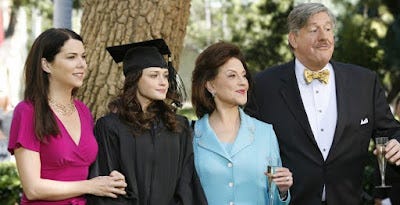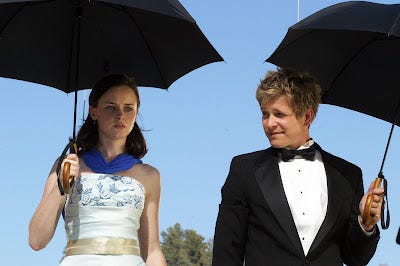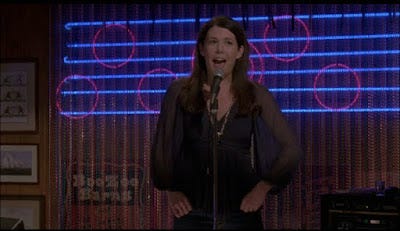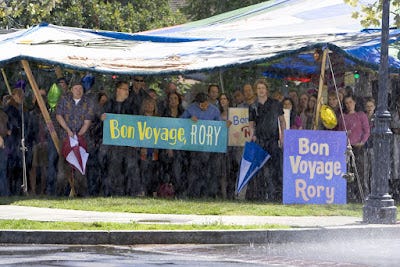"Gilmore Girls" Greatest Hits - The Top 20 Episodes, Part 4: #16 - #20 and the best of the final seasons

So here’s something you may not know about me: There are few things I love on this good earth as much as Gilmore Girls. And with the A Year in the Life ‘reunion’ season debuting on Netflix this Friday, I’ll be spending the week sharing my thoughts on my Top 20 favorite episodes of the series. Why Top 20? Because when I tried to list just 10 I came up with so many more. Gilmore Girls was a qualitatively consistent show – most episodes are at least very good, and few, even during the show’s rougher patches, are obvious outliers one way or another. Normally, I would try ‘ranking’ a list like this, but I quickly found that to be a foolhardy task. I cannot name my favorite episode among these 20, nor can I easily say any of them are better or worse than one another. So instead, we’ll be revisiting these episodes chronologically, from the very beginning to the very end, in four articles, posting Monday through Thursday, featuring 5 episodes apiece. You can read Part 1 here, covering #1 – 5, Part 2 here, covering #6 – 10, and Part 3 here, covering #11 – 15.
So without further ado, let us conclude our journey with Part 4 of the Gilmore Girls Top 20 after the jump…
You Jump, I Jump, Jack (Season 5 Episode 7)
Written by Daniel Palladino; Directed by Kenny Ortega

This episode features three stories: First, Luke meeting Lorelai’s parents (first at dinner, then on the golf course), which is exactly as funny and awkward as it should be, with Luke wanting to give Emily and Richard the benefit of the doubt right up until the moment they drive him fully crazy. Second, there’s Lane and Zach’s first date (which is cute, though not much else at this stage). Third, and most significantly, there is Rory’s adventure with the Life and Death Brigade and her first significant interactions with Logan, which is where the episode’s title is taken from and why the hour earns a spot on this list.
The Life and Death Brigade is a great example of the show’s slightly surreal, thoroughly cartoonish take on academic life and social structures, with the ‘secret society’ Rory had been investigating turning out to be both a strange, juicy story and a liberating experience. This hour is also emblematic of the side of Logan I thought worked best, where he seems more like an adventurous and compassionate person than an outright ‘bad boy’ (a role the writers pretty quickly abandoned for him, given Matt Czuchry’s inherent likability and the initial repetition of Jess’s character type). Of Rory’s boyfriends, I think Czuchry probably gave the best performance, always rising to or making more of what the writers gave him, and he’s very good in this, prompting Rory to come out her shell and take part in the Brigade’s ridiculous stunt. It’s a fun hour, a very good story from Rory’s college years, and definitely one I enjoy revisiting when it when it comes up in the queue.
Say Something (Season 5 Episode 14)
Written and Directed by Daniel Palladino

I’m not a fan, generally, of TV writers immediately putting roadblocks on long-awaited relationships between couples, but in this case, Luke and Lorelai’s first break-up – brought about by a traumatic intervention from Emily in the previous episode – doesn’t feel artificial, instead functioning as something both characters needed to work through for this romance to have staying power. And this episode, where Lorelai reels from the split, is amazingly well-written (I’ll admit I don’t understand some fans’ disdain for Daniel Palladino, given how many great episodes he was responsible for), so observant about these characters and specific in portraying Lorelai’s grief, and especially organic in how it portrays her pulling herself out of it at the end.
Most notably, it features one of the series’ very best – and certainly the single most cinematically striking – scenes, a dream sequence where Lorelai imagines a projector whirring downstairs. Mixing the sets of Lorelai’s living room and Kirk’s makeshift movie theatre, Luke sits on a couch watching the film play dispassionately, his and Lorelai’s first date projected on the screen. Lorelai sits next to him, trying to apologize and mend the relationship, earnestly and achingly. It is a startlingly powerful moment, portraying this apparent gap between the two of them through this liminal space of memory and performance, and relying more on heavily cinematic storytelling the show usually did. The episode is easily one of Lauren Graham’s best, as she modulated through so many emotions and sides of this character in one hour (it’s ridiculous no matter what that she never got an Emmy nomination, let alone a win, and an episode like this makes that seem extra ludicrous). There is some good comedy here – Rory borrowing a limo from Logan to come to her mother’s aide, only for the limo driver to stay and continue helping throughout the day, is a fine running gag – but overall, this is a highlight because of how dark it’s willing to go, and how fully it gives itself over to Lorelai’s emotions. That Luke and Lorelai would, of course, eventually reconcile doesn’t make this episode any less powerful in retrospect; if the show were this good at dissecting the fears and insecurities that went into that relationship moving forward, perhaps some of the rougher patches for the characters in season 6 could have been avoided.
Friday Night’s Alright for Fighting (Season 6 Episode 13)
Written by Amy Sherman-Palladino; Directed by Kenny Ortega

While the conventional wisdom has it that the seventh and (until this Friday) final season was Gilmore Girls’ weakest year, I would contend that dubious honor must go to the sixth. Sure, the seventh season was the one that lacked creator and auteur Amy Sherman-Palladino, but I think David S. Rosenthal and the replacement team settled into a decent if unremarkable groove fairly early, and finished extremely strong, as we shall see in a moment. But Season 6 is the only Gilmore Girls season I would describe as occasionally unpleasant, as the first half was devoted to the feud and separation between Lorelai and Rory – which went on far too long and robbed the show of its most important chemistry – and the second half relied much too heavily on characters lying or keeping things hidden from one another (the Luke and Lorelai romance goes from invigorating to depressing by season’s end). And in the final few episodes, perhaps because the Palladinos knew things were going awry in the world of contracts, it feels like the writing simply gives up, with a penultimate episode devoted to Emily being temporarily blind and a finale that blew up not only the Luke/Lorelai relationship, but many future storytelling possibilities going forward.
This is all a long way of saying that I only have one Season 6 episode on the list, because most of the episodes from that year are tainted by problems noted above. But “Friday Night’s Alright For Fighting” is a genuine standout, thanks to a climactic dinner scene that sees Rory and Lorelai returning to Friday night dinner for the first time in months, only for the show to totally break form in compressing a long evening of arguments and catharsis into one chaotic set-piece. From a filmmaking standpoint, it’s positively inspired, as a season’s worth of tension breaks with handheld camera, swinging violently around from person-to-person at the table in uncomfortable close-ups, the cast going for broke in one long complex take. It’s stupendously written, with these ebbs and flows in the battle, different permutations in the fight as different combinations of Gilmores let each other have it, only to consistently return to moments where everybody is happy and getting along. In the end, it’s not only a necessary release in tension that allowed the show to get back to its status quo, but a nice reminder that at the end of the day, the Gilmores are a family and they love each other, even when they wind up arguing. Add to that an earlier subplot about Rory and Logan trying to get the Yale Daily News out on time after Paris has a meltdown – one of the best Rory-in-college stories, and the most effectively charming Logan ever gets to be – and a slightly-less-uncomfortable-than-usual story about Lorelai, Luke, and his daughter April, and this is absolutely the stand-out hour of the show’s overall weakest season.
Lorelai? Lorelai? (Season 7 Episode 20)
Written by David S. Rosenthal; Directed by Bethany Rooney

It’s finally time to talk about the perpetual elephant in the Gilmore Girls room – Season 7, the final year, produced without creator and voice of the series Amy Sherman-Palladino. Even if I think the sixth season was problematic, there’s no question it’s a creative tragedy she didn’t get to see this series out on her own terms, and that continuing a show where the voice was so central and inimitable without that voice’s source was something of a fool’s errand. That said, I don’t Season 7 was a disaster, nor do I think fans should ignore it or pretend it didn’t exist. The replacement team, led by David S. Rosenthal, couldn’t quite capture the rhythm, tenor, or nuances of Sherman-Palladino’s language, but they largely did right by the characters, and it’s not like the show’s great performances deteriorated in any way. And by the back half of the season, once the show got over the hump of the Lorelai/Christopher affair-turned-marriage (a tricky story inherited from the sixth season cliffhanger) and started aiming for the home stretch, this final season really snapped into focus – and this episode, the show’s antepenultimate outing, includes at least one moment most fans would agree is an outstanding highlight from this ‘black sheep’ season.
The episode climaxes with Lorelai singing “I Will Always Love You” at Karaoke night, a moment that can be described as a serenade to Luke but is a more nuanced situation than that. The episode is largely about different character facing different disappointments and challenges – Rory cannot get a job lined up post-Yale, and Luke’s planned summer vacation with April is cancelled when she’s accepted into a prestigious summer camp – and they all wind up at the Karaoke night (a storyline which is built on one of the weirder elements of Season 7, as it revolves around the replacement creative team’s insistence on pairing Pattie and Babette up as best friends despite the two barely communicating outside of this season). Lorelai’s performance starts as a joke between her and Rory – who gets her mother drunk in order to see her sing – but just as the “bittersweet memories” lyric starts, a dejected Luke walks in; Lorelai notices him, and the tone of what she’s doing changes to something far more earnest and sorrowful, less a serenade to Luke than a plea for him to realize that her feelings were and are still genuine and meaningful. Lauren Graham is just utterly magnificent in the scene – drunk, silly, human, and hurting, all at the same time – and Scott Patterson cannot be ignored as her silent scene partner, reading off the many modulations Graham goes through during the performance.
One scene doesn’t always make an episode great. And on the whole, “Lorelai? Lorelai?” (named for the ‘cliffhanger’ ending in which Logan asks Lorelai’s permission to propose to Rory) isn’t necessarily top-tier Gilmore Girls. But that one scene is indeed stupendous, and much of the material leading up to it is filled with strong character work and acting, and if this creative team couldn’t recreate Amy Sherman-Palladino’s voice, it was clear they were trying their best to honor these characters and their stories as the end drew near. And when that kind of effort results in an emotional climax like the one featured here, it’s more than worthy of inclusion on this list.
Bon Voyage (Season 7 Episode 22)
Written by David S. Rosenthal; Directed by Lee Shallat-Chemel

If I had to slightly qualify my praise for the previous entry on this list, I have no similar qualms here. “Bon Voyage” is a glorious, wonderful finale for Gilmore Girls; under the circumstances, with Sherman-Palladino gone and certain stories (like Luke and Lorelai’s relationship) having been thrown into chaos with her departure, it is hard for me to imagine a better finale. Rory gets a dream job worthy of her potential (covering then-Senator Barack Obama on the campaign trail, a wildly prescient piece of writing for the spring of 2007) and has to leave Stars Hollow, leaving her, Lorelai, Emily, Richard, Luke, and everyone else scrambling to figure out exactly how to move on to a phase they’d all been avoiding for a while.
No, the dialogue here doesn’t crackle the way it did under Sherman-Palladino – but good God does this episode have a lot of heart, not only giving every member of the cast great moments to play, but even paying careful attention to every character’s final words. With Edward Hermann having passed away before the Netflix revival, Richard’s final line is especially moving: “It takes a remarkable person to inspire all this,” he says to Lorelai, putting an absolutely beautiful punctuation mark on the rocky relationship Lorelai and her parents had throughout the series (while Lorelai’s promise to Emily that she’d keep coming around for Friday night dinners made it clear how much progress Lorelai had made with her parents since the show began).
The final ten minutes or so are just about as perfect as one could imagine – Luke and Lorelai reconcile with an old-Hollywood style kiss (“I just wanted to see you happy,” Luke admits when Lorelai asks why he worked so hard to throw Rory’s farewell party), and the next morning, Lorelai gets Rory up early so they can have one last coffee at the diner before Rory has to leave. The series ends where it started, with Lorelai and Luke happily flirting and Lorelai and Rory bantering over caffeine. For these characters, a lot is about to change, but that final scene is an affirmation that their relationships will stay strong and continue to drive them moving forward – and a reminder to the audience that even once they’ve left our screens, the characters of Gilmore Girls will forever exist in these spaces, ready to welcome us back for comfort whenever they are needed.
It’s a special show indeed where one can count both the Pilot and the Finale among the series’ best hours, and while Gilmore Girls had its up and downs in between (especially in those final two turbulent seasons), that it was able to end with so much of its heart in tact is a feat worth celebrating. This will technically cease to be the definitive end of Gilmore Girls this time tomorrow, and I cannot verbally express my excitement to see what Amy Sherman-Palladino has in store in getting to return to her characters one last time. But as the end of the original seven-year series, “Bon Voyage” was exactly what the show and its audience needed, and I wouldn’t want it to be forgotten. This was a joyous, emotional, utterly fulfilling way to say goodbye, a testament to how well the replacement team did by Palladino’s characters in the end, and to what an incredible creation she conjured in the first place.
And that’s it! Those are my twenty favorite episodes of one of my all-time favorite TV series. What are your favorite Gilmore Girls memories? Sound off in the comments, and as time allows, I will try to be back here tomorrow or over the weekend with thoughts on A Year in the Life, which I fully intend to binge the crap out of on Friday. Please check out Part 1, Part 2, and Part 3 of this list if you haven’t already – it was a joy to get to write about this great series before it returns tomorrow.
Follow author Jonathan Lack on Twitter @JonathanLack.

